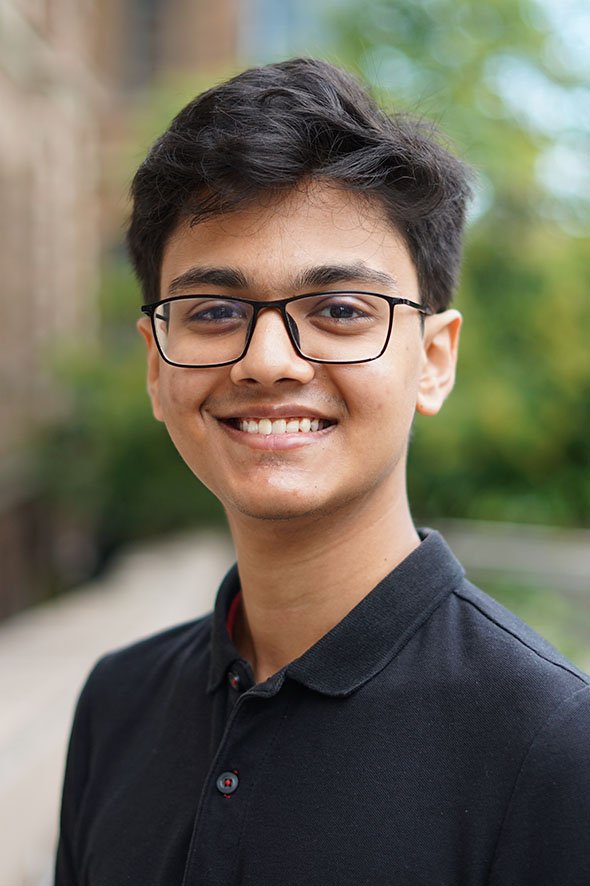Varun Lodaya found his calling in machine learning and AI in his first year.
“My undergrad was simultaneously a roller coaster and transformative,” says Varun Lodaya, a member of University College graduating this spring. “It was very up and down, partly because of COVID.
“But it was also very transformative. The student who just finished his last exam this spring is not the 17-year-old who left Dubai to study at U of T. I feel more confident now in everything I do compared to four years ago.”
Lodaya, who is graduating from a computer science specialist program with a minor in statistical sciences, found his calling in machine learning and artificial intelligence early in his first year and was able to combine that with his interest in life sciences. The mix has led to a full-time job for Lodaya — even before he officially graduates.
“I wanted to be at the intersection of computer and life sciences because I realized the best way for me to learn about life sciences is by combining it with something I'm good at. And so, my new job at Deep Genomics is the perfect place for me to be right now.”
Prior to convocation, A&S News spoke to Lodaya about his undergraduate years and where they’ve led him.
How did you first become interested in artificial intelligence?
Ever since high school, I knew I wanted to study computer science. I also knew there were these cool technologies called artificial intelligence and machine learning — but I didn't know the first thing about them. So early in my first year, I found the club and attended its annual machine learning conference for undergraduates. The conference was called Start AI and gave the keynote address. And I remember listening to Hinton and looking at all these equations on the screen, and realized I didn’t understand what I was hearing or looking at. But it was fascinating, and I thought, maybe in four years, I will understand it. And now, I’ve published machine-learning research and I’m co-president of U of T AI.
Can you tell us more about U of T AI?
The idea of the club is to get U of T undergraduate students involved with AI and to help connect them with opportunities in industry and academia. We organize a variety of initiatives like Start AI. We run an annual research competition called in which we invite teams of undergraduate students from around the world to conduct machine learning research. Then at the end of the competition, papers based on that work that have been submitted for publication are judged by a panel of academic and industry experts, and a winner is awarded a prize of tens of thousands of dollars. It’s great. It’s undergraduate students showing they can do world-class research.
And what was the published research you worked on?
It had to do with a research contest from the Max Planck Institute, the . The idea is to train a “three-fingered” robot to manipulate a cube. But we didn’t take a traditional programming approach of giving it specific instructions, like telling it to move a specific distance in a specific direction. Instead, we told it, here are all the ways you can move; and here’s a “score” that increases when you make a correct move, so your goal is to maximize that number. The robot was in Germany and when we were finished and uploaded our code, it worked great! Seeing the robot pick up this cube and manipulate it correctly was very exciting.
Can you tell us about Deep Genomics and what you’re doing there?
is a company founded by U of T’s that is pioneering AI-powered drug development. I was an intern there before, but now I’m a full-time machine-learning engineer, which is this happy hybrid between a machine-learning researcher and software engineer. I help train models effectively by doing software engineering. It's the closest thing I can imagine to a dream job that doesn’t require a graduate degree. This is pretty much exactly where I want to be before I move on to grad school. I'm very happy with it.
Looking back, what’s a highlight of the past four years?
My view now is that an undergraduate degree is the same everywhere. It’s not like mathematics in Toronto is different from math in Dubai. But what’s different from university to university are the people teaching you — and that’s everything. For example, my intro’ machine-learning professor was who’s a world-class researcher in the field. And there was , who sadly passed away in 2021. He was the best professor I ever had. His way of teaching calculus fundamentally changed the way I looked at my education, my undergrad, everything. It’s professors like these who had such an impact on my life. And it’s not so much what they've taught me, but that they taught me how to learn.
How important was your experience at University College?
In short, there would be no Varun Lodaya without University College! So many of my fondest memories of U of T are from my experience at UC. In residence, on the residence council, in student government, with the people I met. None of my computer science work would have been possible without that support. I would not have had the time nor the confidence to do what I did without University College.
Finally, what advice would you give students starting their first year?
Right from your first week, you should be exploring all the opportunities available to you. You should be asking yourself: What can I do while I’m at U of T? For example, the lets you join an instructor’s research program. Or, they don’t know that events like the AI conference exist. So, talk to people about what you’re interested in. You’ll find lots that interests you. Because you don’t want to graduate, thinking about all the things you could’ve done here but didn’t.
— by Chris Sasaki for A&S News


